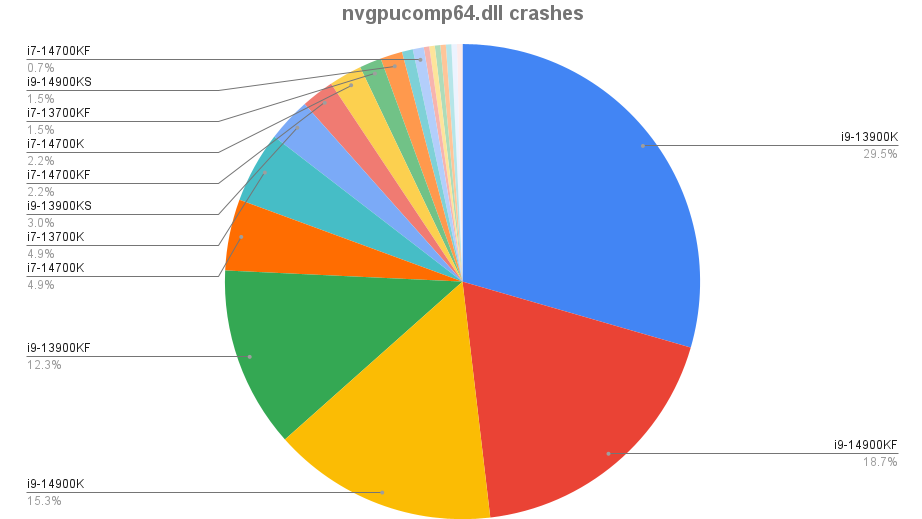The water for Intel keeps getting hotter amidst ongoing 13th Gen and 14th Gen CPU crashing issues. On July 9, Warframe developers added to the fire by reporting bothWarframeplayer crash statisticsand even a developer who was experiencing the same issue. As noted by theWarframeteam, the staff member in question wasn’t overclocking and was even using a new PC, but even the most basic in-game tasks resulted in hard crashes.
Surprisingly, stress testing similar machines across the Warframe dev team did not show similar results. But spurred by an Intel report, theWarframedev team applied a BIOS update to the sole team member who couldn’t play the game without crashing, and a BIOS update at least seemed to help. So, there’s a non-zero chance that the statistics we’ve shared below may be reduced by some prudent BIOS updates from 13th and 14th Generation Intel CPU users— but there’s likely more to this story, based on what we already know.

While theWarframedevelopment team was able to fix their own in-house Intel crashing issue, this is not the same story being reported by others. Just yesterday, we reported on Alderon Games, developers ofPath of Titans,experiencing a 100% crash ratewith seemingly any server or development PC using a 13th Gen or 14th Gen Intel CPU. They even noted that the CPUs seem to be deteriorating over time. Thus, they have pivoted their server backend entirely to using AMD systems, deeming Intel’s latest desktop socket releases “defective.”
These issues aren’t exclusive to Warframe or Path of Titans, either.Epic Gameshas noted that Fortnite, arguably the biggest multiplatform multiplayer game ever, frequently crashes on 13th- and 14th-generation Intel CPUs.

At the time of writing, not even Intel seems to understand what’s going on entirely. However, at least one issue (Turbo Boost at unsafe temperatures) can be attested to poor power (and thus thermal) management on Intel CPUs. It is a sensible cause of system stability issues and may even explain the steady deterioration of Intel CPUs reported by Alderon Games. It also seems to make overclocking 13th Gen and 14th Gen Intel CPUs risky, especially if you aren’t going “all the way” with liquid cooling.
Hopefully, these issues won’t be plaguing Intel users for much longer, and the appropriate updates—and notice to apply those updates—will eventually eliminate this issue from the equation. Ahead of Intel’s Arrow Lake launch on desktop later this year, though, this certainly isn’t a good look on the part of Team Blue, who shouldn’t be getting lazy with that top-dog spot in the market.

Get Tom’s Hardware’s best news and in-depth reviews, straight to your inbox.
Christopher Harper has been a successful freelance tech writer specializing in PC hardware and gaming since 2015, and ghostwrote for various B2B clients in High School before that. Outside of work, Christopher is best known to friends and rivals as an active competitive player in various eSports (particularly fighting games and arena shooters) and a purveyor of music ranging from Jimi Hendrix to Killer Mike to the Sonic Adventure 2 soundtrack.